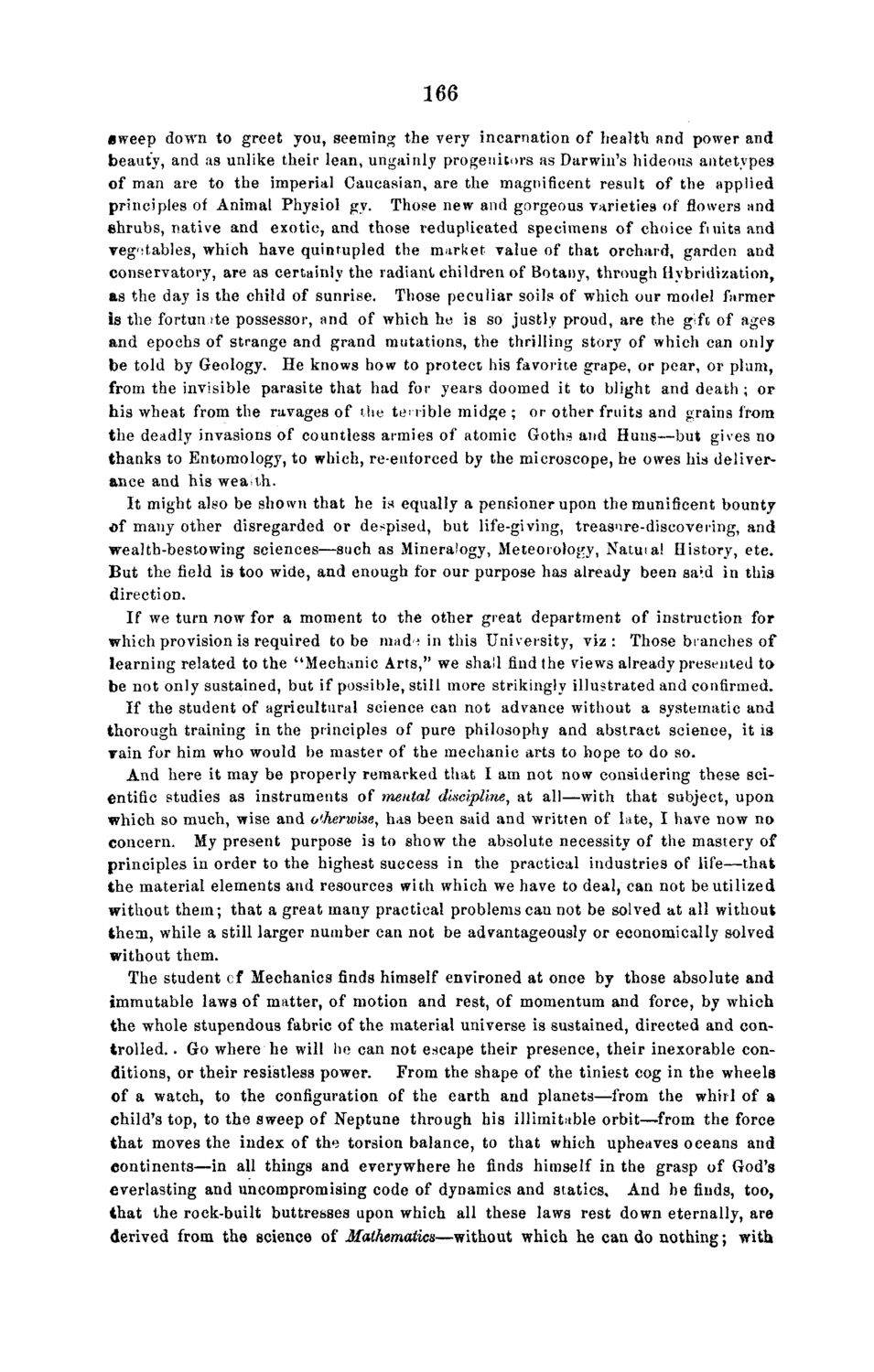| |
| |
Caption: Board of Trustees Minutes - 1868
This is a reduced-resolution page image for fast online browsing.

EXTRACTED TEXT FROM PAGE:
166 sweep down to greet you, seeming the very incarnation of health and power and beauty, and as unlike their lean, ungainly progenitors as Darwin's hideous antetypes of man are to the imperial Caucasian, are the magnificent result of the applied principles of Animal Physiol gy. Those new and gorgeous varieties of flowers and shrubs, native and exotic, and those reduplicated specimens of choice fiuita and vegotables, which have quintupled the market value of that orchard, garden and conservatory, are as certainly the radiant children of Botany, through Hybridization, as the day is the child of sunrise. Those peculiar soils of which our model farmer is the fortun ite possessor, and of which he is so justly proud, are the g ft of ages and epochs of strange and grand mutations, the thrilling story of which can only be told by Geology. He knows how to protect his favorite grape, or pear, or plum, from the invisible parasite that had for years doomed it to blight and death; or his wheat from the ravages of the terrible midge ; or other fruits and grains from the deadly invasions of countless armies of atomic Goths and Huns—but gives no thanks to Entomology, to which, re-entorced by the microscope, he owes his deliverance and his wealth. It might also be shown that he is equally a pensioner upon the munificent bounty of many other disregarded or despised, but life-giving, treasure-discovering, and wealth-bestowing sciences—such as Mineralogy, Meteorology, Natuial History, e t c But the field is too wide, and enough for our purpose has already been sard in this direction. If we turn now for a moment to the other great department of instruction for which provision is required to be mad ; in this University, viz: Those branches of learning related to the ''Mechanic Arts," we shall find (he views already presented to be not only sustained, but if possible, still more strikingly illustrated and confirmed. If the student of agricultural science can not advance without a systematic and thorough training in the principles of pure philosophy and abstract science, it is Tain for him who would be master of the mechanic arts to hope to do so. And here it may be properly remarked that I am not now considering these scientific studies as instruments of mental discipline, at all—with that subject, upon which so much, wise and otherwise, has been said and written of Lite, I have now no concern. My present purpose is to show the absolute necessity of the mastery of principles in order to the highest success in the practical industries of life—that the material elements and resources with which we have to deal, can not be utilized without them; that a great many practical problems can not be solved at all without them, while a still larger number can not be advantageously or economically solved without them. The student of Mechanics finds himself environed at once by those absolute and immutable laws of matter, of motion and rest, of momentum and force, by which the whole stupendous fabric of the material universe is sustained, directed and controlled. . Go where he will he can not escape their presence, their inexorable conditions, or their resistless power. From the shape of the tiniest cog in the wheels of a watch, to the configuration of the earth and planets—from the whirl of a child's top, to the sweep of Neptune through his illimitable orbit—from the force that moves the index of the torsion balance, to that which upheaves oceans and continents—in all things and everywhere he finds himself in the grasp of God's everlasting and uncompromising code of dynamics and statics. And he finds, too, that the rock-built buttresses upon which all these laws rest down eternally, are derived from the science of Mathematics—without which he can do nothing; with
| |